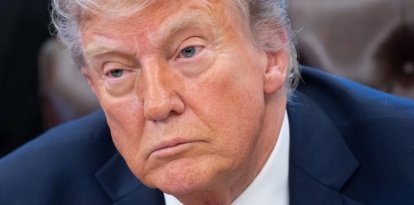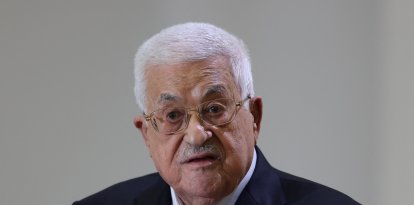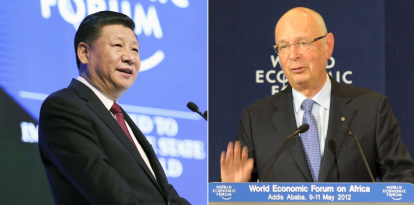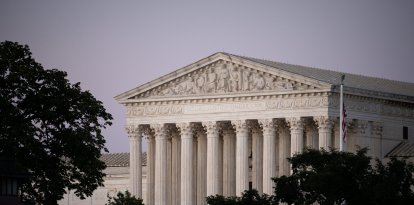Iran and the Art of the Deal
In the face of those who claim that reaching a good nuclear deal with Iran is impossible, the Administration must continue its efforts. If these fail, the sooner it contemplates the military option, the better.
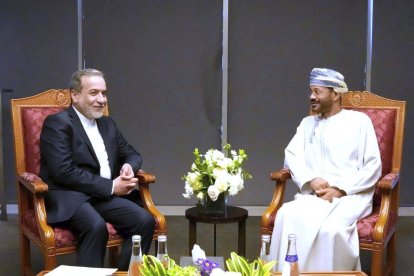
Iranian Foreign Minister Abbas Araghchi (left) with his Omani counterpart, Sayyid Badr Albusaidi.
Earlier this March, President Trump sent a letter to Iran via Oman urging Tehran's leaders to meet for dialogue and negotiate the future of its nuclear program. As he himself told Fox, in the missive he gave an ultimatum: two months to reach an agreement or he would have to think of other alternatives, "if we have to go in militarily, it's going to be a terrible thing — for them."
Iran first denied having received the letter and finally responded after a few weeks that it would be ready to return to the negotiating table. Something it had refused to do with the previous US president, despite continued concessions from the Biden Administration.
A first round took place on Saturday 12, in Oman, and the following week, on Saturday 19, the second, this time in Rome. On the US side, the meeting was led by the president's special envoy for the Middle East, Steve Witkoff, and on the Iranian side, the foreign minister, Abbas Araghchi. And in the middle, the Omani foreign minister, who has acted as a facilitator of the crossing of positions.
Although all parties speak of a cordial atmosphere and understanding, little is known for certain about the content of the talks. Largely because each is trying to safeguard its position, but also because on the American side there has been a series of openly contradictory statements.
"President Trump is right to demand that these negotiations not drag on indefinitely. That is what Tehran would want."
But what we do know for sure are a few key points:
The first, the speed with which these meetings have been arranged, which will continue in the coming days. This can be seen as strong evidence that both sides wish to reach an agreement and thus avoid an open military confrontation.
Secondly, the parties have made their starting points known: The United States, that Iran cannot agree to an atomic bomb and must therefore give up its nuclear program; Iran, that it does not agree to dismantle its nuclear facilities, let alone its associated long-range missile program; for its part, Israel has said that the agreement must aim at the total dismantlement of the nuclear program, like Libya.
Third, that these negotiations cannot drag on forever, something that would benefit Iran, but which President Trump does not seem willing to accept.
Trump seeks an international breakthrough; Iran buys time
Somewhat less clear are the motivations of each party for sitting at the negotiating table. On the part of the American president, everything points to a personal desire to resolve a strategic issue through dialogue so that he can present himself to public opinion as an effective leader who by pressure alone achieves his goals.
For Iran, negotiating is a vital necessity: while a little more than a year ago it saw itself as the victorious and almost hegemonic power in the entire region, from the Gulf to the Levant, today it sees how its expansionist strategy and its own pawns are progressively evaporating: its crown jewel, Hezbollah in Lebanon, has been practically rendered useless by Israel; Assad's Syria, in which it invested so much in material and human means, has become hostile territory under the new leadership of Ahmed Al-Sharaa; the Houthis in Yemen, so many months of roaming free and threatening free navigation in the Red Sea, are being punished by US forces, and the ballistic and cruise missiles they launch against Israel do little damage, being mostly intercepted before they reach their targets; Iran's own direct attacks against Israel have been a resounding failure, while Israel's reactions, however restrained, have destroyed its most advanced air defense systems, as well as part of its industrial missile base, without any operational problems; finally, the national economy continues to experience very serious problems that it is unable to solve either with the help of Russia or with the sale of oil to China.
In short, Iran needs time to recompose its strategic situation and to be able to make further progress towards its first atomic bomb.

Politics
Iran says nuclear talks with US are 'progressing' and will continue next week
Diane Hernández
We also know with some clarity what the terms of a satisfactory agreement would be, although here the parties still disagree. For the United States, an agreement that would prevent Iran from continuing on the path of nuclearization. Moreover, an agreement that, unlike the JCPOA signed by Obama in 2015 and denounced by Trump during his first term in 2018, prevents Iran's enrichment of uranium. In addition, the establishment of a system of inspections that would make compliance with the pact truly verifiable.
The Iranian side, however, would like to retain its right to enrich, to keep practically all the components already installed (which would allow it to reactivate the final phase towards the bomb with very little time), to leave associated programs, such as ballistic missiles, on the sidelines, and to lift sanctions, as of now.
What we do not know, because each side wants to retain maximum flexibility during the negotiations, is how much each side is really willing to concede.
The pressure to negotiate, even if it is still indirectly thanks to Oman's diplomatic mediation (which reveals that the American side is willing to give up some of its principles, since in his letter Trump called for "direct" talks), leads us to think that there will be some kind of agreement that avoids American military action. And precisely this has set off all the alarms about whether the agreement to be signed will be good, bad or average.
An agreement... good, bad, impossible?
Given the years of Iranian deceit, lies and tricks that have ensured that the nuclear program not only has not stopped but has advanced to where it is today, a few weeks away from being able to have a nuclear weapon if they so decide, a good agreement could only come from the total interruption of their atomic program, ideally regarding the enrichment of fissile material, the manufacture and assembly of the components of a nuclear warhead, as well as the delivery vehicles.
Moreover, a good agreement should entail the destruction of the centrifuges, so that enrichment cannot be resumed, the dismantling of the associated technical equipment and, let us not forget, the international availability of the enriched material.
Those who believe that negotiations can lead this time to such a good agreement are based on the belief that the Iranian regime would be willing to give up its nuclear program in order to survive. They would give up the Queen to protect the King, to use a chess simile.
However, there are many other voices - and very qualified ones - who see a good agreement as impossible to reach. Essentially because they believe that Tehran does not follow the same logic as in the Western world and that there, today, they are convinced that giving in on its nuclear program would leave the regime more exposed and vulnerable, as it would lose its great blackmailing trump card on the world stage and its only deterrent umbrella against military fickleness against it.
For this school of thought, the fate of the regime would be inextricably linked to the development of the atomic program. Therefore, any agreement the Iranians are willing to sign would be far from what Westerners consider a good deal. Tehran might agree to a freeze on the program, but not to its dismantlement. And that would be a bad deal because it would give the Iranian regime a lifeline to reconstitute itself and continue its Islamist, Shiite and revolutionary march in the not too distant future.
The strategic problem facing Trump is defined by how the debate is being conducted in the circles surrounding him and which present the Iranian issue in a single binomial: agreement or military intervention. What is more, some of the senior officials and experts of the current Administration have gone so far as to say that Iran is very far from America and that American interests demand staying out of any conflict in the area.
But as former Secretary of State, Mike Pompeo, has recently said, between capitulating and accepting a bad deal that solves nothing and a direct American attack, there are many other options. And for starters, it is true: apply a strategy of maximum pressure that stifles the already battered Iranian economy; try to reach a global agreement with Russia, which further isolates Iran... and if all that fails, contribute to Israel leading any military action.
President Trump is absolutely right to demand that these negotiations not drag on indefinitely. That is what Tehran would want. But if he himself concludes that Iran is not interested in frank and constructive negotiation, the sooner he considers military action, even if it is from the back seat with Israel at the wheel, the better. The window of vulnerability Iran suffers from today is not going to remain open forever.
RECOMMENDATION
